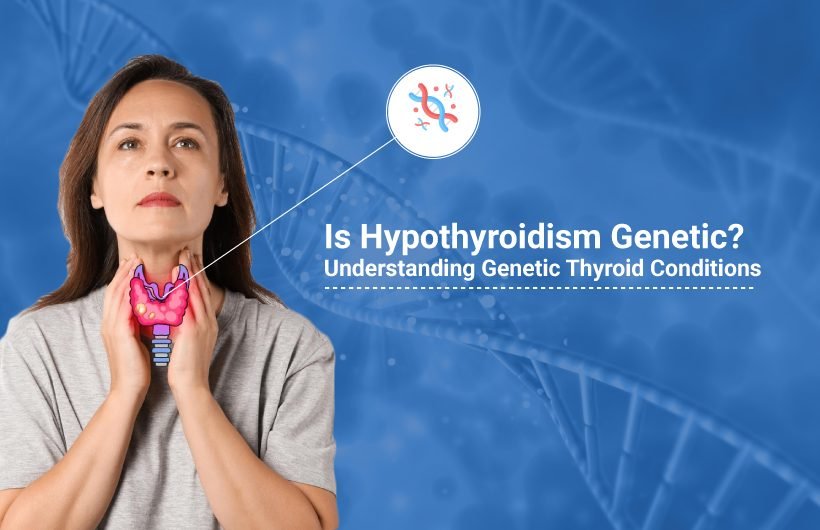Hypothyroidism, the condition where your thyroid just doesn’t get the job done, is known for slowing down your body’s processes. When your thyroid gland is on strike, you might feel like you’re dragging through life—fatigue, weight gain, body aches, and an intolerance to the cold. In rare cases, it can even push your body to the brink, leading to myxedema coma, a serious threat to life.
Are You Born with Hypothyroidism?
Some folks enter this world with hypothyroidism, a condition known as congenital hypothyroidism. It affects about 1 in 2,500 newborns. It happens when the thyroid gland isn’t fully formed at birth or something goes awry in hormone production during fetal development. Without early treatment, this can mess with growth, motor skills, and can cause intellectual issues later on.
Does Congenital Hypothyroidism Mean It’s Inherited?
Being born with something doesn’t always mean it was handed down like a family heirloom. Congenital just means it’s there from birth. There are many reasons why the thyroid gland might not develop properly in a fetus. Genetic factors are responsible for about 2-5% of congenital hypothyroidism cases, but often, the cause remains a mystery.
Is Hypothyroidism Genetic or Environmental?
The answer isn’t black and white—hypothyroidism can be influenced by both genetic and environmental factors.
Genetic Component of Hypothyroidism
The genetic causes are those you inherit from your folks or mutations you acquire along the way. About 65% of your thyroid hormone production can be pinned on genetics. Your genes are like the directors, telling your body how to handle everyday functions that impact the thyroid.
- Inherited Variants: Some genetic factors might interfere with how your thyroid works or how it forms in the first place.
- Acquired Mutations: These are changes to specific cells’ DNA that affect the thyroid.
A 2018 study even found a genetic mutation that could screw up how your body metabolizes thyroid hormone, making traditional treatments less effective for some people.
Environmental Component of Hypothyroidism
Environmental influences are all about the stuff around you and what you put into your body. A 2021 review pointed out multiple environmental factors that can mess with your thyroid:
- Smoking and Booze: Both can take a toll on your thyroid health.
- High BMI: Carrying extra weight can be a factor.
- Diet: Certain micronutrients, or the lack thereof, in your food.
- Exercise Levels: Or the lack of exercise.
- Pollutants: Exposure to environmental toxins.
Certain medications and surgeries can also play a role. Environmental factors account for about 20% of autoimmune hypothyroidism causes.
Genetic Testing and Hypothyroidism
Genetic testing can provide valuable insights into whether you are at risk for hypothyroidism. This section will cover:
- Purpose of Genetic Testing: To identify inherited genetic variants that may predispose individuals to hypothyroidism.
- Types of Genetic Tests: Specific tests that can pinpoint mutations associated with thyroid dysfunction.
- Benefits and Limitations: Understanding what genetic testing can and cannot tell you about your thyroid health.
- How to Get Tested: Steps to take if you’re considering genetic testing for thyroid conditions.
Common Causes of Hypothyroidism
Autoimmune diseases take the cake when it comes to common causes. Hashimoto’s thyroiditis tops the list. This condition sees your immune system going rogue, attacking your thyroid gland. Other causes include:
- Thyroiditis: Inflammation of the thyroid.
- Congenital Hypothyroidism: Present at birth.
- Radiation Therapy: Especially around the neck.
- Surgical Removal: Of all or part of the thyroid.
- Iodine Imbalance: Too much or too little can be a problem.
- Pituitary Gland Damage: This can mess with thyroid function.
- Certain Medications: Like lithium.
Genetic and Environmental Risk Factors
Hypothyroidism can run in families. If your family tree includes congenital hypothyroidism, your risk is significantly higher—up to 15 times more likely than the general population.
Preventing Hypothyroidism
You can’t rewrite your genetic code, but you can tweak your lifestyle to lower the risk:
- Healthy Lifestyle: Balanced diet, regular exercise.
- Avoid Toxins: Stay away from radiation and pollutants.
- Quit Smoking: Kick the habit to keep your thyroid in check.
- Regular Monitoring: Keep an eye on thyroid function, especially if you have a family history.
Advances in Treating Genetic Thyroid Conditions
Positioning: After “Preventing Hypothyroidism”
The treatment of genetic thyroid conditions has seen significant advancements. This section will explore:
- New Medications: Innovations in drugs that are more effective for individuals with specific genetic profiles.
- Personalized Medicine: How treatments can be tailored based on genetic testing results.
- Emerging Therapies: Cutting-edge treatments and therapies in development for genetic thyroid conditions.
- Case Studies: Examples of how these advances have improved patient outcomes.
Conclusion
Hypothyroidism is a complex interplay of genetic and environmental factors. While you can’t always dodge the genetic bullet, understanding your risks and managing lifestyle factors can help. Early symptom recognition and working closely with Endocrinologist in Ahmedabad Dr. Moxit Shah, can make a significant difference. Stay informed, and proactive, and take control of your thyroid health to effectively manage hypothyroidism.






